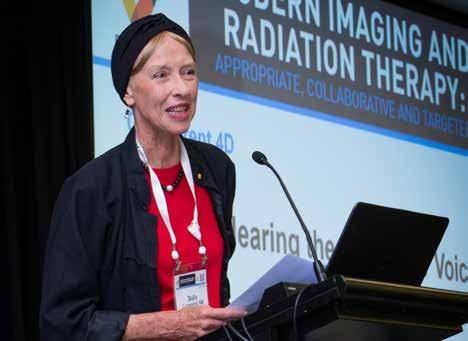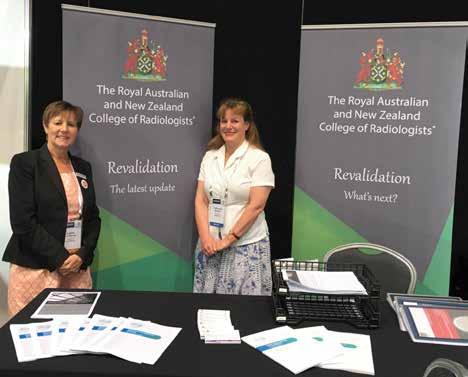
11 minute read
InsideRadiology 31 Targeting Cancer
from Inside News December 2016
by RANZCR
Since its launch in 2013, the Radiation Oncology Targeting Cancer campaign has made steady progress in various areas.
It was considered timely to review the original objectives of the campaign and to determine an optimal strategy moving forward, with the aims of maximising impact, using resources efficiently, attracting additional funding and providing robust measures of the desired outcomes.
Over the next 12-18 months, the campaign will focus on advocacy for prostate cancer, considering the potential gap for men receiving radiation therapy and the problem of accessing radiation oncology opinions for definitive (curative) treatment in this disease.
Palliative radiation therapy indications (especially bone pain) will be the next area of focus. Metrics will need to be developed to measure the progress of the campaign in these specific areas. The campaign team will continue its collaboration with Tonic Health Media (THM) in early 2017 to develop a number of promotional videos highlighting the need for men to fully investigate their prostate cancer treatment options. These videos will be broadcast through the THM GP Clinics Network and other channels in 2017. This initiative is generously supported by Varian Medical Systems Australasia.
GP Education Programs
The Campaign continues to reach out to the larger GP community to improve their knowledge of radiation therapy. This has been achieved through presentations at Health Ed events across five capital cities (over 2000 GPs), and The Royal Australian College of General Practitioners Annual Scientific Meeting (many hundreds of GPs). The GP Oncology Education Evenings continue to be the mainstream activity for the campaign. We would like to thank our members and the teams from those sites for organising these events. If you are interested in hosting a GP Oncology Education Evening, please contact us at faculty@ranzcr.edu.au and we will provide all the materials to assist you.
Thank You to All Participants in the Targeting Cancer Fun Run
The Targeting Cancer Fun Run/Walk was another successful and fun social event at the 2016 Annual Scientific Meeting with close to 100 participants, including radiologists, radiation oncologists and allied health professionals, together with their family and friends. Thank you to Genesis Cancer Care and Queensland X-Ray for their support of the event, and the campaign. We were fortunate to have Jana Pittman, Olympian and two time World Champion, with us at the fun run. Jana is now an official ambassador for the Targeting Cancer campaign. As a medical student herself, and training in surgical gynae-oncology, Jana has become a passionate advocate for broader awareness of the importance of radiation therapy as a highly effective treatment option for cancer patients.
How YOU Can Get Involved
We are always looking for patient stories/photos and good news stories that will help raise the profile of our profession and of radiation therapy as a treatment option. Please contact us at faculty@ranzcr.edu.au if you would like to share your stories. Like Targeting Cancer on Facebook, or follow @targetingcancer on Twitter, and help us spread the word. Please help us make Targeting Cancer THE brand to promote our fantastic treatment!
If you have any questions about the Targeting Cancer campaign or would like to get involved, please contact Legend Lee, Senior Projects Officer at the College on faculty@ranzcr.edu.au
Participants at the Targeting Cancer Fun Run
The Consumer Viewpoint: An Interview with Sally Crossing
Sally Crossing AM is the founder of Breast Cancer Action Group NSW and Cancer Voices Australia. Through Cancer Voices, she facilitates the Australian Cancer Consumer Network, a group of 30 consumer related cancer organisations. Sally is the consumer representative on the College’s Faculty of Radiation Oncology (FRO) Council. Initially diagnosed with early stage breast cancer over 20 years ago, Sally continues to fight the disease today.
RANZCR Archivist, Eva StokesBlake recently interviewed Sally about her experiences as a consumer advocate for cancer treatment. Here are some of the highlights…
Did you set out to become an advocate for cancer care?
SC: The cancer “just happened” to me, and it made me realise it just happened to other people too, [some of whom are] less able to access information and advice. It’s not just cancer care. Cancer care is terribly important of course, but it’s everything else that goes in support of the good cancer outcome, for example access to information right through to consumers being involved in research. There’s a great range of aspects that go to support a good cancer outcome and experience. Having got cancer, I decided it was a worthwhile thing to give up my paid career and start this new career, which is voluntary, in advocacy for people affected by cancer.
During your appointment on FRO Council you have legitimised consumer approval on latest treatments for patients, the education of GP’s etc. Can you explain why you thought this was necessary?
SC: During meetings of the Council, issues would come up that will affect people with cancer, for example informed financial consent and treatment consent. Some patients want to know what supports good cancer treatment, and they should be reassured that proper processes are followed by people who practise the specialty.
Ms Sally Crossing at the Annual Scientific Meeting

Can you tell us a little about ‘Consumers Included’, the logo branding concept launched by Cancer Voices in April this year?
SC: ‘Consumers Included’ is like a heart tick, but for cancer, for those organisations which hold conferences and events. If they include consumers, for example, by supporting them financially, enabling some participation and inviting them in the first place (there are five criteria in total), then they get this seal of approval. RANZCR was the first big organisation to take that up very enthusiastically [at the 2016 ASM] and there have been ten others already.
Where do you see the future of patient treatment?
SC: I’d like to see all cancer patients treated at comprehensive cancer centres (whether it’s in the public or private system) with multi-disciplinary care, where the surgeons, medical oncologists and radiation oncologists all talk to each other to decide what’s the best path or action of treatment that they are going to offer the patient, not give the patient. The shared decision-making concept is the important one. When you take responsibility for your own treatment, you will be much more alert to what’s happening and how to manage it. The involved, engaged, informed patient working with the involved, engaged, informed health professional is the best way.
What is your perspective on the College since your involvement as consumer representative?
SC: [The College is] Very inclusive, very willing to listen. They always seek my advice and often take it, and even better, appreciate it. I do it because it has become a passion and a commitment to put [forward] the voice of people affected by cancer, but when you actually see it working and you’re accepted as a necessary and welcomed part of the team, it’s really good on both sides, I think.
Listen to the full interview at bit.ly/ranzcrrecalls

Revalidation – The Latest News
‘The process by which doctors have to regularly show that their knowledge and skills are up to date, and fit to practise medicine’ – IAMRA 2016 The Medical Board of Australia (MBA) and their appointed Revalidation Expert Advisory Group (EAG) held meetings with the medical colleges in August 2016. The MBA and EAG presented their Interim Report and Discussion Paper on Revalidation at both meetings. The Discussion Paper proposed two distinct components: • Strengthened continuing professional development • At risk and poorly performing medical practitioners. The Discussion Paper considered performance review, by means of peer review and multi-source feedback tools as recommended voluntary activities. ‘Category 7 – Maintenance of Professional Standards’ was included in the College’s CPD program for the new triennium 2016-2018, in preparation for revalidation and this program has been recognised by the MBA as a strengthened and robust program. The College commenced a member consultation of the Discussion Paper and Interim Report on 20 September 2016. A revalidation booth, attended by representatives of the College staff and volunteer Fellows, was present at the Annual Scientific Meeting on the Gold Coast. This provided an opportunity for attendees at the ASM to ask questions or discuss the implications and their concerns. Members were also encouraged to complete the revalidation feedback form. The member consultation closed on 23 October 2016, with much interest and comment. The College collated the feedback from the member consultation and submitted this to the MBA on 30 November 2016. The submission is available on the College website www.ranzcr.edu.au/ adovcacy/submissions The EAG will collate all feedback received from the consultation and propose a final report on their findings to the Medical Board of Australia in July 2017. Further information can be found on the MBA website www.medicalboard.gov. au/Registration/Revalidation.aspx

Laina De Winne, Head of Member Engagement with Dr Catherine Mandel who volunteered to meet colleagues and answer questions about revalidation.
Further member consultation will continue throughout the coming year. The College will keep you informed. If you have any questions or comments about revalidation, please contact Laina De Winne on members@ranzcr.edu.au
What Makes a ‘Good’ Clinical Radiologist and Radiation Oncologist? How can we improve trainee selection?
Selecting the optimal doctors in our training programs will have a strong influence on the future of our specialties. Whilst the majority of the time we get it ‘right’, the College recognises that its selection processes have room for improvement and is committed to ensuring that selection into the training programs is conducted in a reliable and valid way. The Trainee Selection Guidelines were introduced in 2014 and are now up for review. The aim of the review is to align the selection criteria with the curriculum, to undertake consultation with our members and to ensure that selection is underpinned by a sound evidence base. In a complementary development, the RANZCR Rural and Regional Needs Assessment Report (2015) highlighted issues with selection that were contributing to the current geographic maldistribution of our workforce.
In order to address this, the College needs to better support recruitment and retention in non-metropolitan areas. One of the report’s recommendations, accepted by both Councils, was for the College to review the Trainee Selection Guidelines to enable it to support a skilled and sustainable clinical radiology and radiation oncology workforce in non-metropolitan areas. The College recognises that there is a growing need to better understand the knowledge, skills, abilities and attributes required to be an effective clinical radiologist and radiation oncologist, and to link these to trainee selection criteria. In addition, our competency-based training programs recognise that there are many other facets of the clinical radiologist’s and radiation oncologist’s roles that contribute to the ‘ideal’ specialist in our disciplines, outside of being medical experts. Although academic achievement is a reasonable predictor of subsequent performance, it is not the case that those with high academic ability alone can be trained to become competent clinical radiologists and radiation oncologists. Hence, we should examine methods that reliably evaluate other (and in some cases more) reliable predictors of specialist performance. This will include some non-academic personal attributes, values and motivational qualities. Consideration needs to be given to what can be ‘taught’ during training and what attributes one should possess at the point of entry into the training program. This will also widen access to training. College members are questioning how to combine merit-based selection with the need to include candidates who will go on to be actively involved in research, education, leadership and regional practice. It is expected that during the review process, some answers will arise to help ensure effective future leadership within both professions and to address current workforce issues.
The College has held discussions with members. It has also commissioned Work Psychology Group (WPG), an international, research-led consulting practice, with expertise in medical education and training selection and assessment, to advise us. WPG recommend that the cornerstone of an effective selection system is by a thorough analysis of the relevant knowledge, skills, attributes and other personal qualities, beyond clinical knowledge and academic achievement, associated with successful performance in the professions. This process is called a Job Analysis and enables accurate identification of criteria to be targeted as part of selection into training. The Job Analysis will result in a competency framework being developed for each specialty, which will be validated by the membership. Once the competency framework is accepted by our Education and Training Committees and Councils, it will be used to update the Trainee Selection Guidelines. In 2017, members will be invited to participate in the validation survey, the aim of which is to validate the competencies identified during the Job Analysis and provide an opportunity for you to identify any additional knowledge, skills and attributes not yet identified. The validation survey will be open in February and March 2017 to all members to complete online. We are excited about this project and believe that the Job Analysis will strengthen the entire selection process. We strongly encourage you to be part of defining the future of our specialties through the completion of the survey and/or providing other input. For further information about the Job Analysis, its methods and the project group members, please visit www.ranzcr.edu.au/training/overview/ trainee-selection-review
If you have any questions or comments regarding the trainee selection review, please contact Danielle Callahan, Executive Assistant to CEO, at the College on danielle.callahan@ranzcr.edu.au or +61 2 9268 9757

